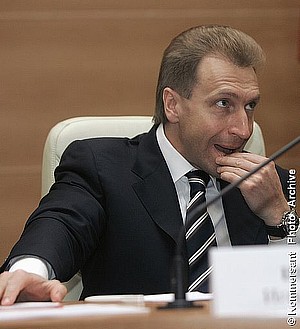
RUSSIA, EUROPE DRAW BATTLE LINES IN THEIR DISPUTE OVER ENERGY
Publication: Eurasia Daily Monitor Volume: 3 Issue: 103
By:

After the discussions at the latest Russia-European Union summit laid bare the growing disagreements between Moscow and the European bloc over how to guarantee “energy security” to the Old Continent’s countries, the leaders of the pro-Western GUAM grouping (Georgia, Ukraine, Azerbaijan, Moldova) launched an initiative that appears to be aimed at breaking Russia’s monopoly on fuel supplies to Europe. The stage seems to be set for further geo-strategic competition between Russia and the West.
As most analysts predicted, the May 25 meeting between Russian President Vladimir Putin and the top EU officials in the Black Sea resort town of Sochi failed to produce an agreement on energy policies. The energy disputes have hung over the relationship since last January, when a brief disruption in Russian gas supplies to some Western European countries amid a price war with Ukraine sent shock waves across the Continent.
Europeans fear excessive energy reliance on Russia, which supplies one-quarter of Europe’s gas. There is an increasing perception within the EU that Moscow is willing to use energy as a political weapon. Meanwhile, Russia is aggressively seeking access to European retail gas markets. Remarkably, Putin stated in Sochi that the EU has to take what he termed “reciprocal steps” if it wants more access to “the holy of holies of our economy” — Russia’s energy sector.
Despite all the positive spin that the summit participants tried to put on the event, they had to concede that, their common interest in easing the dispute over energy supplies and markets notwithstanding, some important differences clearly remained. As European Commission President José Manuel Barroso acknowledged, there were still “sensitivities” that needed to be addressed. Some Russian and international analysts even described the “energy dialogue” as “conversations between the deaf and the dumb” that constitute a continuous “tug of war” between Europe (which seeks to secure its interests as an energy consumer) and Russia (which believes its interests as energy supplier are being endangered).
It would appear, however, that the battle lines were drawn well before the European dignitaries met with the Kremlin leader. In the run-up to the Sochi gathering, Brussels repeatedly appealed to Moscow to ratify the 1994 Energy Charter Treaty that would effectively end Gazprom’s monopoly over Russia’s pipeline system. Naturally, Russia refuses to ratify the Energy Charter as well as the Transit protocol in their current form, fearing that giving the European companies access to its export network would be a huge — and unjustified — concession to its competitors. Moreover, prior to the Russia-EU summit, the Kremlin had tried to make it perfectly clear to Brussels that Russia would set its own policies and stay the course no matter what.
Moscow’s defiant stance was particularly revealing in the wide-ranging interview that Putin’s top aide, Igor Shuvalov, gave to Nezavisimaya gazeta on May 23. In his remarks, the Kremlin official was extremely blunt about how the Russian leadership sees the energy relationship with Europe. His main message was as follows: for the foreseeable future, European countries have no other viable alternative energy source but Russian hydrocarbons. Indeed, according some estimates, by 2030, more than 60% of EU gas imports are expected to come from Russia. Shuvalov stated that Russia is ready to supply Europe with oil and gas on a long-term basis, adding that the Kremlin would like to play the leadership role in the relationship. Meanwhile, he continued, Russian energy companies would develop their business overseas. “We will be expanding further, whether our European partners like it or not,” he argued.
Shuvalov also blasted the West’s reluctance to see Russia as part of the G-8 economic discussion group, calling it a “purely political” decision. Implying that Russia’s impact on global economic processes — primarily as the key energy supplier — is very significant, he asked the Western leaders: “Don’t you think it is ridiculous that you sit down and discuss issues of energy security without Russia?”
Needless to say, Shuvalov’s swagger did not sound like music to European ears: the Kremlin’s tough stance appears to be a sure sign that Russia and the West are growing further apart on the energy issue. Within this context, the attempt by Georgia, Ukraine, Azerbaijan, and Moldova to revitalize the moribund GUAM to counterbalance Russia’s energy clout in the region is likely seen as a positive development in Brussels (see EDM, May 25).
At the May 22-23 GUAM summit in Kyiv, the participants gave the regional grouping a new name — the Organization for Democracy and Economic Development (ODED) — and singled out the “energy component” as the main focus of the renewed GUAM’s activity. Ukraine’s President Viktor Yushchenko was quite explicit about the grouping’s goal to challenge Moscow’s energy-export dominance. “Azerbaijan has unique oil-producing capabilities, while Ukraine has unique oil transit facilities. Why don’t we unite them?” Yushchenko suggested.
It remains to be seen, of course, how effective ODED-GUAM will be. What is certain, however, is the continuation of the Russia-West geopolitical rivalry in the post-Soviet lands. As the Russian special envoy to the EU, Vladimir Chizhov, recently acknowledged, a space does exist between Russia and the EU where both international actors viciously compete.
(Rossiiskaya gazeta, Moscow Times, May 26; RFE/RL, Kommersant, Vremya novostei, May 25; Izvestiya, Novye izvestiya, Politcom.ru, May 24; Gazeta, Komsomolskaya pravda, Nezavisimaya gazeta, May 23)




